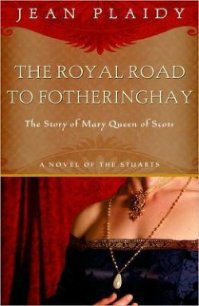The Captive Queen of Scots - Plaidy Jean (читать книги онлайн бесплатно без сокращение бесплатно txt) 📗
One thing I should never tolerate, Bess told herself, is an unfaithful husband.
She had no fear. Any woman who could flout Queen Elizabeth and maneuver herself back into favor could do anything.
Why not a little dancing? A little music on the lute or virginals?
She suggested to Mary that she should invite the company to her apartments, and Mary joyfully agreed.
There after the banquet Mary played the lute and sang to the company; and she felt so much recovered that, when the dancing began, she found her feet tapping to the tune and she was unable to resist trying a measure.
Willie Douglas begged for the honor, and graciously she consented to his wish.
Willie’s eyes were full of dreams. She knew he was thinking regretfully of escapes which had come to nothing, and desperately trying to think of one which would succeed.
She felt hopeful. I have so many good friends, she told herself.
THERE WAS A COMMOTION at the castle gates.
Bess, who immediately went down to see what was happening, was struck with dismay when she recognized the livery of Huntingdon’s men.
“What is the meaning of this?” she demanded.
Before she could receive an answer she was joined by her husband. “Huntingdon’s men have returned,” he cried. “I had thought them at Court by now.”
And as she spoke Huntingdon himself was riding toward her. He dismounted and a groom immediately took his horse.
“To what do we owe this pleasure?” demanded Bess with sarcasm.
Huntingdon came straight to the point. “Northumberland and Westmorland are in revolt. They are marching on Tutbury and are but some fifty miles from us. There must not be a moment’s delay. I am ordered by Her Majesty to take the Queen of Scots from here at once.”
Shrewsbury said: “And what are Her Majesty’s orders concerning us?”
“You are to come with us to protect the Queen of Scots if necessary from the rebels. I have an armed guard with me. We should go to the Queen’s apartments immediately. We must be gone from here before an hour has elapsed, for it is unsafe to stay longer.”
Mary was startled when the Earls of Huntingdon and Shrewsbury came to her.
She listened in dismay.
Leave Tutbury! It was what she had been praying for. But in very different circumstances from these.
IX
Coventry
THE FIRST HALT ON THE FLIGHT from Tutbury was at Huntingdon’s castle at Ashby-de-la-Zouch.
This castle, set in wooded country, was a magnificent building which had been erected by Alan de la Zouch in the reign of Henry III, and in such contrast to dreary Tutbury that Mary might have welcomed the change had it not been that she was once more under the guardianship of Huntingdon.
“Only three days free of him,” he said to Bess, “and here he is again. Do you think he has brought me to Ashby to murder me?”
“He dare not. The Queen would never allow it.”
“There are some,” remarked Mary ruefully, “who are prepared to disobey not only the Queen of Scots but the Queen of England.”
“Not Huntingdon. He values his head too much. You need have no fear,” Bess went on. “While I am here no harm shall come to you.”
Such was the personality of the Countess that Mary took courage from her presence. Nevertheless she was relieved when that long night was over and they left Huntingdon’s mansion.
There was no time for delay. Ashby was too uncomfortably close to Tutbury for the party to be allowed to stay there, and Coventry was the next destination, some twenty-six miles on.
They halted at the Three Tuns Inn at Atherstone for refreshment on their way and then rode hard for Coventry, a town where a defense might be put up against the rebels, for a strong wall surrounded it on which were thirty well fortified towers.
But no preparation had been made in Coventry for the arrival of the party, and Huntingdon and Shrewsbury consulted together as to where they could find lodging for the Queen.
Bess said that as the Queen was very weary and far from well they should find a lodging for her and continue their conference later. She suggested the Black Bull Inn in Smithford Street not far from the Greyfriars gateway.
“There she can be well guarded,” she went on, “until a more seemly lodging can be found. It would be a sorry matter if we were forced to flee again, and the Queen too sick to travel.”
Mary was not displeased to find herself in a hostelry which, although infinitely smaller, had more comfort to offer her than gloomy Tutbury. There was excitement among her friends because, with the Northern Catholics on the march and herself being hustled from place to place, rescue seemed more likely than it could be while she was incarcerated within the strong walls of a fortress. She had brought with her, in spite of the hasty flight, twenty-five of her friends on whom she could rely absolutely, led by such stalwarts as Mary Seton, Jane Kennedy, Willie Douglas, the Livingstones and Marie Courcelles. There were also two members of the Beaton family—Andrew and Archibald—the former her Master of the Household, the latter her usher; and she knew that they would readily give their lives for her. There were times when she believed she would never be able to express her gratitude to these people who, from choice, shared her captivity with her.
Bess, who had established herself in command of the whole company and even managed to subdue Huntingdon, advised her husband to write at once to Elizabeth telling her that Mary had been safely conveyed to Coventry and that she was now held at the Black Bull Inn.
The letter was written and, while Elizabeth’s reply was awaited, Huntingdon discussed the possibility of reducing the number of Mary’s servants, for if they must needs move on, it was no easy matter to convey such a large party.
“That,” said Bess, “is a matter of less import than some. The Queen will be desolate if she is parted from her friends. This is no time to concern ourselves with the reduction of her household. Furthermore if you turn these people adrift at such a time they will join the rebels with valuable information. Let well alone.”
Huntingdon was forced to accept the logic of this, and he did not broach the subject to Mary as he had intended. He satisfied himself, during their stay at the Black Bull, with making sure that the Queen was well guarded night and day.
Elizabeth’s reply was choleric, and she wrote individually to both Shrewsbury and Huntingdon. She was furious and a little frightened, as she always was when confronted by rebellion among her subjects. She was relying on the Earl of Sussex who was stationed at York, and Sir George Bowes who was at Barnard’s Castle, to subdue the rebels. In the meantime she berated the Earls for so demeaning royalty by taking a Queen to an Inn. They were to remove Mary at once and find some suitable house in Coventry—a good and loyal city—where she was to remain until commanded to do otherwise; and Elizabeth expected her prisoner to be guarded day and night.
Bess, who had already been looking for a suitable residence—she herself considered it somewhat demeaning for a Countess to stay at an Inn—had discovered an old house known as St. Mary’s Hall, and her inspection of this had shown her that it contained adequate lodging for the Queen.
Immediately on receipt of Elizabeth’s letter Mary was taken to St. Mary’s Hall and there a large room, which was called the Mayoress’s Parlor, was given to her as her presence chamber; there were other rooms connected by a wooden gallery, which served as bedchamber and ante-chamber for Mary. Her ladies were housed in smaller rooms connected with those allotted to Mary; and in the circumstances Bess considered that they had housed the Queen satisfactorily.




